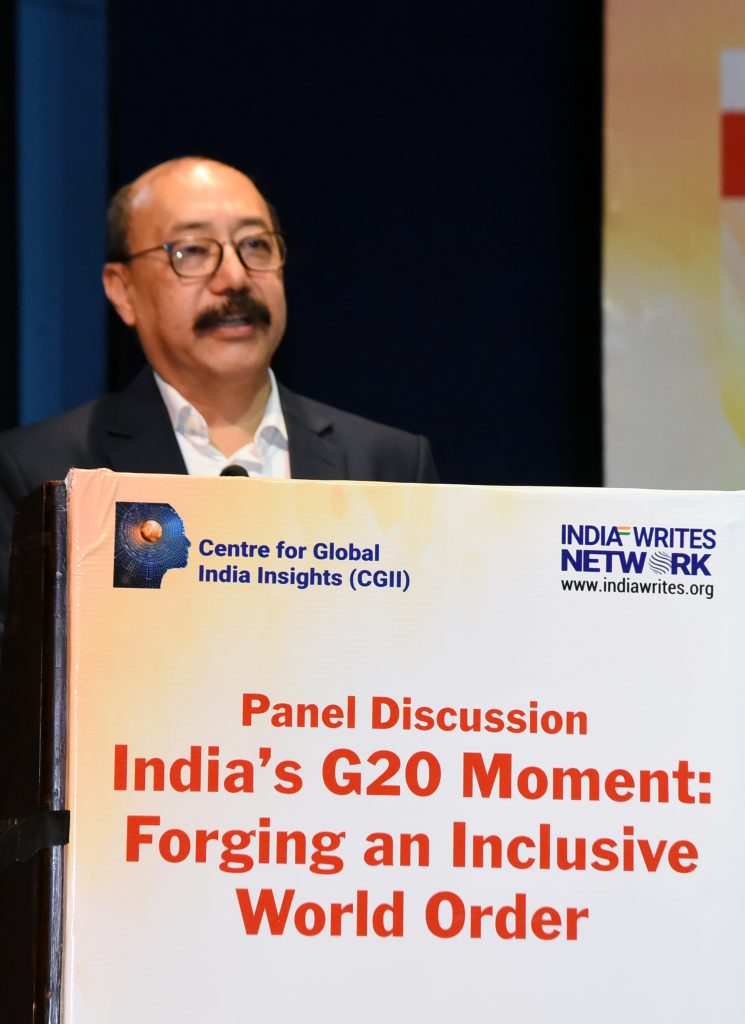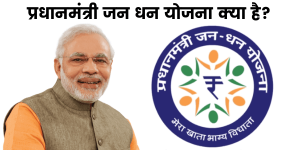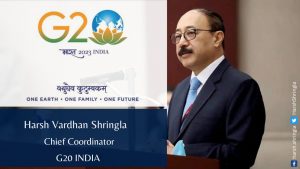By HARSH VARDHAN SHRINGLA

India has taken over the prestigious G20 Presidency amidst a complex and challenging environment. The crises of today are of varying shades and degrees – be it climate or geopolitical – and have presented us with a unique opportunity to lead the charge, as G20 President, towards an inclusive, human-centric world order.
As a G7 partner, a member of BRICS and QUAD, the current chair of the SCO and G20, and also the ‘Voice of the Global South’, India has the distinctive honour to offer lasting and meaningful solutions and perspectives to collectively address global concerns, while acting as a bridge between developing countries and advanced economies.
Great Expectations
There is a welcome expectation from India that as a large emerging economy, which has implemented innovative and far-reaching measures to improve governance and the living standards of its billion plus people, it will be able to provide solutions for the global challenges of the day. This responsibility becomes increasingly significant as current global governance structures – that have been in place for the past eight decades – failed to prevent or resolve the crises of the past few years.
Prime Minister Narendra Modi had said, “We must also admit that the tragic consequences of this failure are being faced most of all by the developing countries. After years of progress, we are at risk today of moving back on the Sustainable Development Goals.”
The priorities of India’s G20 presidency, thus, are to shape an inclusive sustainable global future and to share India’s best practices across sectors. This ambition was set in stone by Prime Minister Modi in Bali last year when he said that India’s G20 Presidency would be “inclusive, ambitious, decisive and action-oriented”.
This exercise in inclusivity begins with the decision to hold G20 meetings in every state and Union Territory of India rather than confining them to the capital. So far, 131 G20 meetings have been held in 48 different locations in India, covering all but two states and Union Territories.

The theme of India’s G20 presidency – ‘Vasudhaiva Kutumbakam’ or “One Earth One Family One Future” – is drawn from the ancient Sanskrit text of the Maha Upanishad. Essentially, the theme affirms the value of all life – human, animal, plant, and micro-organisms – and their interconnectedness on planet Earth and in the wider universe.
The theme also spotlights LiFE (Lifestyle for Environment), with its associated, environmentally sustainable and responsible choices, both at the level of individual lifestyles as well as national development, leading to globally transformative actions resulting in a cleaner, greener and bluer future. The theme conveys a powerful message of India’s G20 presidency, which is of striving for just and equitable growth for all in the world, as we navigate through these turbulent times, in a sustainable, holistic, responsible, and inclusive manner. They represent a uniquely Indian approach to our G20 presidency, of living in harmony with the surrounding ecosystem.
Invitees under India’s G20 presidency reflect another facet of inclusivity. Africa will be strongly represented under India’s G20 presidency with the participation of South Africa (G20 member), Comoros (President of the African Union), Nigeria, Egypt (invitee country and NEPAD Chair) and Mauritius.
Widening the Canvas
Participation in the G20 under India’s presidency has not been confined to G20 members or invitee countries. In a bid to enrich and broaden the base of discussions, other countries and regional and international organisations have also been invited to specific G20 meetings. For instance, Norway, with an interest and expertise in the blue economy, has been invited to the G20 meeting on ocean’s health. Similarly, the G20’s Global Partnership for Financial Inclusion (GPFI), under India’s presidency, includes some 40 countries and regional organisations. This is a forum for sharing best practices and models of financial inclusion with developing countries.
As Prime Minister Modi has reiterated, sustainable lifestyles are crucial for the environment: “Our lifestyles should complement our commitments for climate actions.” Prime Minister Modi’s call for a ‘pro-planet people’s movement’ is an exercise in inclusivity in its most fundamental sense. India recognises that climate change cannot be fought from conference tables alone and needs to be fought from the dinner tables in every home. To achieve this, a collective effort by every individual is essential. The circular economy and “Waste to Wealth” are also crucial concepts that India intends to promote as part of the G20 Presidency.
Blending Domestic & Global
India’s inclusive approach followed under the G20 presidency is an extension of its existing domestic approach to development and progress, which specifically focuses on engaging all sections of society, particularly the weaker sections. Take digital public infrastructure, for instance. It has enabled the government to deliver the benefits of development directly to citizens in all parts of the country and has achieved this goal in a transparent, smooth, and corruption-free manner.
The Direct Benefit Transfer Scheme was implemented through Digital Public Infrastructure, along with the “Jan Dhan Aadhaar” trinity of identity cards, affordable internet telephony rates and “banking the unbankable.” Through this scheme, 480 million previously “un-banked” Indian citizens now hold bank accounts and directly receive government benefits from programmes such as the National Rural Landless Employment Guarantee scheme or the Pradhan Mantri Garib Kalyan package.
The Pradhan Mantri Jan Dhan Yojana benefits women immensely as 56% of the Jan-Dhan account holders are women with 67% of these accounts based in rural and semi-urban areas. This fact underlines the quintessentially inclusive character of India’s development programme. It is not surprising therefore that ‘women-led development’ is a major priority of India’s G20 presidency.
In a similar vein, the approach towards public health has also been inclusive and impactful. Through the COWIN platform, over 2 billion vaccines have been administered to our citizens. Additionally, the “Ayushman Bharat” scheme, the world’s largest publicly funded health insurance scheme, has touched the lives of over 500 million citizens.
Another crucial area of focus has been sanitation and availability of drinking water with more than 110 million sanitation facilities created across the country. In addition, about 110 million rural households out of 150 million have also been provided with access to drinking water at their homes. The ‘Har Ghar Jal’ initiative aims at ensuring that every household has access to water. These are just some examples of India’s commitment towards inclusive development which aims at involving all its citizens, especially those from the weaker sections of the society.
Global Public Good

The challenge of inclusivity lies in making sure that every single citizen in a country is provided with the basic necessities of life while ensuring that there is enough social security support for them, and India is consistently making huge strides in this aspect. Working for the global public good has been an important objective of India’s foreign policy as was evident during the COVID-19 pandemic. India shared medicines like hydroxychloroquine with over 190 countries in the world while also sharing the ‘Made in India’ vaccines with over 150 countries through the ‘Vaccine Maitri’ programme.
In the past decade or so, India’s development assistance quantum has doubled and lines of credit have expanded from $14 billion to almost $30 billion. Furthermore, within the Indo-Pacific region, India, along with some of its partners, is a first responder in extending humanitarian action and disaster relief.
At its core, India’s G20 presidency is a people-oriented event, through a ‘Jan Bhagidhari’ or people’s participation approach and because of it, there is a great amount of enthusiasm within the country for the G20.
Larger public participation at G20-related events, through seminars, conferences, quiz-competitions, Model-G20 and festivals, facilitates their involvement as stakeholders in the G20 presidency process.
Global South
As Prime Minister Modi underlined in his remarks in February this year to G20 Finance Ministers and G20 Central Bank Governors, the G20 must focus on “discussions on the most vulnerable citizens of the world”. It was with this human-centric development mindset that he convened the Voice of Global South Summit, attended by heads of state, governments and ministers from 125 countries, soon after India took over the G-20 Presidency.
Harsh Vardhan ShringlaThe democratization and reform of multilateral institutions has been a key theme of India’s international discourse in the past few years and so, India will aim to build consensus on all issues among G20 members to achieve definite outcomes during its presidency. The world order created after World War II has become archaic; it lacks the ability to solve the problems of the day and hence lost credibility in the eyes of the world. India thus emerges as a beacon of hope in these times.
As Prime Minister Modi has said, India stands ready and willing to help fellow developing countries in their development journeys in any way we can. India is happy to share our experience, know-how and best practices with the world, to take us all forward collectively, on our 2030 vision of Sustainable Development Goals and empower our people.
The need is to identify “simple, scalable and sustainable solutions” that can inclusively transform our societies and economies.
By firmly believing in inclusivity and taking everyone on board the path to growth and prosperity, India has shown what it means to lead by example. At a time when multiple crises of a global magnitude affect us all, the importance of keeping Vasudhaiva Kutumbakam’s sentiment alive has never been more critical.

(Harsh Vardhan Shringla is the Chief Coordinator of India’s G20 Presidency. Prior to this, he was Foreign Secretary of India. In a four-decade long Indian Foreign Service career, he has been Ambassador to the United States of America, Bangladesh and Thailand. He was also Consul General of India in Durban, South Africa and Ho Chi Minh City, Vietnam. He is also an experienced multilateral diplomat, having worked on two UN Security Council tenures, served in the Indian Mission to the UN in New York and as Permanent Representative to UNESCAP.)
- This article has been published in the Special Edition of India and The World, a prestigious magazine-journal focused on international affairs, published by Centre for Global India Insights and India Writes Network. Eminent diplomats and experts have contributed to this special volume.
Author Profile
- India Writes Network (www.indiawrites.org) is an emerging think tank and a media-publishing company focused on international affairs & the India Story. Centre for Global India Insights is the research arm of India Writes Network. To subscribe to India and the World, write to editor@indiawrites.org. A venture of TGII Media Private Limited, a leading media, publishing and consultancy company, IWN has carved a niche for balanced and exhaustive reporting and analysis of international affairs. Eminent personalities, politicians, diplomats, authors, strategy gurus and news-makers have contributed to India Writes Network, as also “India and the World,” a magazine focused on global affairs.
Latest entries
 DiplomacyJanuary 5, 2026India walks diplomatic tightrope over US operation in Venezuela
DiplomacyJanuary 5, 2026India walks diplomatic tightrope over US operation in Venezuela India and the WorldNovember 26, 2025G20@20: Africa’s Moment – The Once and Future World Order
India and the WorldNovember 26, 2025G20@20: Africa’s Moment – The Once and Future World Order DiplomacyOctober 4, 2025UNGA Resolution 2758 Must Not Be Distorted, One-China Principle Brooks No Challenge
DiplomacyOctober 4, 2025UNGA Resolution 2758 Must Not Be Distorted, One-China Principle Brooks No Challenge India and the WorldJuly 26, 2025MPs, diplomats laud Operation Sindoor, call for national unity to combat Pakistan-sponsored terror
India and the WorldJuly 26, 2025MPs, diplomats laud Operation Sindoor, call for national unity to combat Pakistan-sponsored terror







